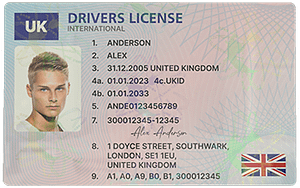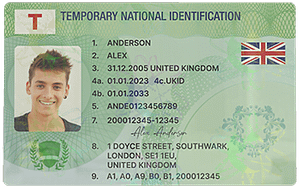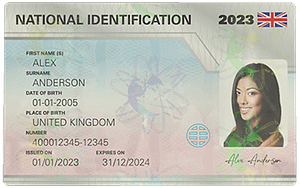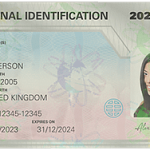Receiving a conviction related to a fake ID card can have serious consequences for your life, including potential fines, probation, or even imprisonment. However, the legal system provides you with the right to appeal such a conviction if you believe there were errors in the trial process or if new evidence has emerged. This article will guide you through the steps and key considerations when appealing a conviction related to a fake ID card.
Understand the Grounds for Appeal
The first and crucial step in the appeal process is to identify valid grounds for your appeal. There are several common reasons that may form the basis of an appeal:
- Errors in the trial: This could include improper jury instructions given by the judge. For example, if the judge incorrectly defined the elements of the crime related to the fake ID card, it may have led the jury to an incorrect verdict. Another instance could be the admission of inadmissible evidence. Suppose evidence was obtained through an illegal search and seizure, but the judge allowed it to be presented in court. Such errors can undermine the fairness of the trial and are valid grounds for appeal.
- Newly – discovered evidence: If new evidence comes to light after the trial that could potentially change the outcome of the case, it can be a strong basis for an appeal. For example, new witness testimony that was unavailable during the trial or documents that were not previously known about and that can exonerate you or cast doubt on the prosecution’s case.
- Ineffective assistance of counsel: If you can prove that your trial lawyer did not provide adequate representation, it may be grounds for an appeal. This could involve the lawyer failing to investigate key witnesses, not presenting relevant evidence, or making strategic errors during the trial.
Timing is Crucial
There are strict time limits for filing an appeal. In most jurisdictions, you will have a specific number of days from the date of the conviction or the entry of the final judgment to file a notice of appeal. Missing this deadline can result in your appeal being dismissed outright. It is essential to consult with an attorney as soon as possible after the conviction to ensure that you meet all the necessary deadlines.

Retain an Appellate Attorney
Appealing a conviction is a complex legal process that requires a deep understanding of appellate law. It is highly recommended that you retain an experienced appellate attorney. An appellate attorney has the expertise to:
- Identify the strongest grounds for your appeal based on the specific facts of your case and the applicable law.
- Prepare and file the necessary legal documents accurately and within the required time – frames. These documents typically include a notice of appeal, an appellant’s brief (which outlines the legal arguments for why the conviction should be overturned), and may also involve responding to the appellee’s brief (the prosecution’s response to your appeal).
- Present oral arguments in court if required. Oral arguments provide an opportunity for your attorney to directly address the appellate court judges and answer any questions they may have regarding your appeal.
The Appeal Process
- Filing the Notice of Appeal: The first formal step in the appeal process is filing a notice of appeal with the appropriate appellate court. This document notifies the court and the other parties (usually the prosecution) that you are appealing the conviction. The notice of appeal will typically include basic information such as your name, the case number, the court that issued the conviction, and a statement of your intention to appeal.
- Preparing the Record: The appellate court will base its decision on the record of the trial, which includes transcripts of the trial proceedings, exhibits, and other relevant documents. Your attorney will work with the court clerk to obtain copies of these materials and ensure that they are properly organized and presented to the appellate court.
- Briefing: After the record is prepared, both you (the appellant) and the prosecution (the appellee) will file written briefs. Your attorney will draft an appellant’s brief that presents your legal arguments for why the conviction should be reversed. This will involve analyzing the errors made during the trial, discussing the relevant laws, and explaining how they support your appeal. The prosecution will then file an appellee’s brief in response, arguing why the conviction should be upheld.
- Oral Arguments (if applicable): Some appellate courts may schedule oral arguments. During oral arguments, your attorney will have a limited amount of time (usually 15 – 30 minutes) to present your case directly to the appellate court judges. The judges may interrupt with questions to clarify points or seek more information. The prosecution will also have an opportunity to present its arguments and respond to your attorney’s points.
- Decision – Making: After considering the briefs and, if applicable, the oral arguments, the appellate court will issue a decision. The court may affirm the conviction (uphold it as it is), reverse the conviction (overturn it), or remand the case back to the trial court for further proceedings, such as a new trial or additional hearings.
Common Problems and Solutions
1. Difficulty in Identifying Grounds for Appeal
Problem: Many defendants may not be aware of the legal technicalities that can form the basis of an appeal. They may feel that the trial was unfair but struggle to pinpoint specific errors or new evidence that would be sufficient to convince an appellate court.
Solution: Consult with an experienced appellate attorney as soon as possible. The attorney will review the entire trial record, including the judge’s instructions, the evidence presented, and the conduct of the trial. They can identify potential errors, such as improper jury instructions or illegal evidence collection, and also help determine if any newly – discovered evidence is relevant and admissible for an appeal.
2. Missing the Appeal Deadline
Problem: The strict time limits for filing an appeal can be easily missed, especially if the defendant is not fully aware of the requirements or is dealing with other post – conviction issues, such as starting a prison sentence or paying fines.

Solution: As soon as the conviction is handed down, consult with an attorney who can keep track of the appeal deadline for you. The attorney can also file the notice of appeal promptly and ensure that all subsequent deadlines related to the appeal process, such as filing briefs, are met.
3. High Cost of Appellate Representation
Problem: Appellate attorneys often charge high fees for their services due to the complexity of the work involved. For many defendants, especially those who have already faced financial consequences due to the conviction (such as fines), the cost of hiring an appellate attorney can be a significant barrier.
Solution: Some defendants may be eligible for pro bono or low – cost legal services. There are legal aid organizations and公益律师 (pro bono lawyers) who may be willing to take on certain appeal cases, especially if they involve issues of injustice or if the defendant cannot afford private representation. Additionally, some attorneys may be willing to work out a payment plan to make their services more affordable.

4. Lack of Understanding of Appellate Procedures
Problem: The appellate process is different from the trial process and can be quite complex. Defendants may be confused about the different steps, such as filing briefs, preparing the record, and presenting oral arguments. This lack of understanding can lead to mistakes or delays in the appeal process.
Solution: Your appellate attorney should provide you with a clear explanation of the entire appeal process. They can walk you through each step, explain the purpose of each document and procedure, and answer any questions you may have. Additionally, there are some legal self – help resources available online or at local law libraries that can provide general information about appellate procedures, although it is still advisable to rely on your attorney’s professional advice.
5. Unfavorable Appellate Court Rulings
Problem: Even with a strong case, there is no guarantee that the appellate court will rule in your favor. If the court affirms the conviction or issues an unfavorable ruling, the defendant may feel defeated and not know what to do next.
Solution: If the initial appellate court ruling is unfavorable, you may have the option to appeal to a higher court, depending on the jurisdiction and the nature of the case. Your attorney can advise you on the feasibility of a further appeal and help you decide whether it is worth pursuing. Additionally, in some cases, you may be able to explore other post – conviction remedies, such as filing a habeas corpus petition if there are claims of constitutional violations that were not properly addressed during the appeal process.


